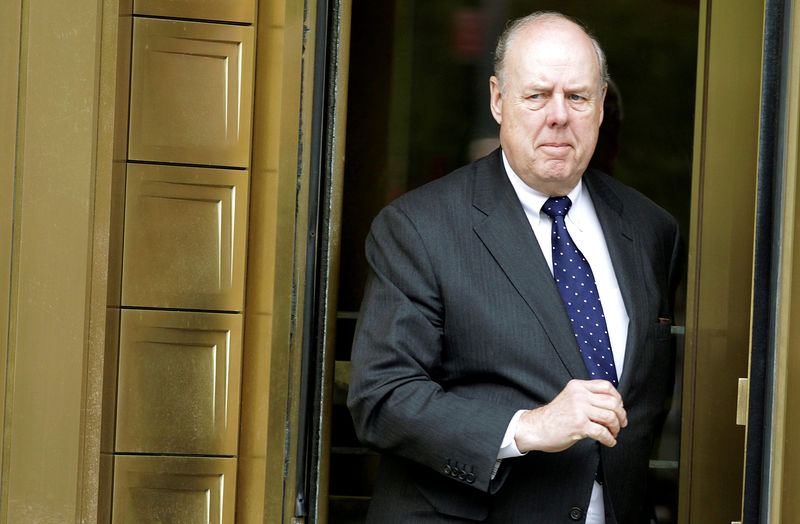By Jan Wolfe and Karen Freifeld
(Reuters) - President Donald Trump's personal lawyer's legal arguments in defense of the president's tweets about former U.S. national security advisor Michael Flynn have been greeted with some skepticism by legal experts.
In seeking to explain a Trump tweet on Saturday lawyer John Dowd told Reuters on Sunday that he wrote and "bollixed up" the president's tweet in which Trump said he fired Michael Flynn for lying to the FBI and not just misleading U.S. Vice President Mike Pence.
Some observers have said the tweet showed Trump knew Flynn had committed a crime and sought to obstruct justice by, among other actions, firing then FBI director James Comey.
Dowd denied Trump knew Flynn had lied to the FBI, but raised new questions by also providing a further account of the January meetings in which former Acting U.S. Attorney General Sally Yates warned White House Counsel Don McGahn that Flynn was a security risk because he had lied about his conversations with former Russian Ambassador Sergey Kislyak.
According to Dowd, Yates told McGahn that Flynn said the same thing to the FBI as he did to Pence but Yates did not convey that Flynn was facing criminal prosecution. Dowd said McGahn reported the conversation to Trump in that manner.
“You may conclude that’s a lie, but the Department of Justice, that had the power to charge, did not,” Dowd said. “The first time the president knows for a fact this guy lies was when he was charged.”
But several lawyers said, regardless of whether Yates explicitly said Flynn lied to the FBI, the White House counsel should have seen that possibility and communicated it to the president.
"It's not every day that the acting attorney general comes over to the White House with that sort of message," said Alex Whiting, a former federal prosecutor now teaching at Harvard Law School. "It had to have been obvious to McGahn that Flynn probably lied to the FBI whether Yates said it or not."
Michael Gerhardt, a law professor at the University of North Carolina, called Dowd's argument "a stretch" but said there might be a "bit of credibility" in the idea that McGahn might have been waiting for more clarity before informing the president about Flynn's criminal liability.
Neither Yates nor McGahn could be reached for comment on Monday. Dowd also declined requests for further comment on Monday.
Yates' testimony in May before a Senate committee, in which she said she declined to answer McGahn when he asked about Flynn's FBI interview, appears to conflict with Dowd's account. According to a person familiar with the matter, Yates never said that Flynn told FBI agents the same thing he told Pence. Dowd said he stood by his version of events.
Flynn pleaded guilty last Friday to a charge of lying to the FBI brought by Special Counsel Robert Mueller, who is leading a probe into alleged Russian interference in the 2016 election and possible obstruction of justice by the Trump administration.
Russia has denied meddling in the 2016 U.S. election and Trump has denied any collusion took place between Russia and his election campaign.
Dowd also argued on Sunday that Trump could not commit the crime of obstruction of justice because "he's the chief law enforcement officer of the U.S."
Former prosecutor Robert Ray said there was some merit to the argument that Trump could not obstruct justice by firing Comey because he had the power do so.
But several other lawyers took issue with Dowd's comments, noting President Richard Nixon faced impeachment for obstruction of justice prior to his resignation over the Watergate scandal.
“It's a patently absurd argument," said Andrew Wright, a former White House lawyer under President Barack Obama. "The president as the chief executive sits on top of the org chart, but he has to take care to see that the law is followed."
